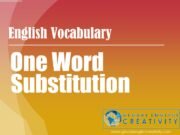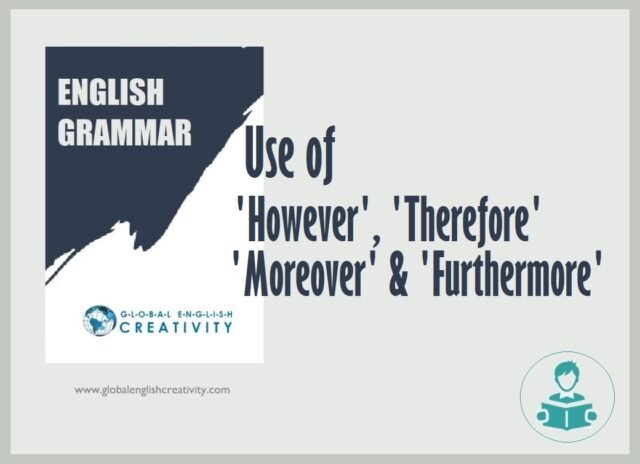Using “However,” “Therefore,” “Moreover,” & “Furthermore”
Transitional words and phrases like “however,” “therefore,” “moreover,” and “furthermore” are essential tools in English grammar. They help to connect ideas, signal relationships, and improve the flow of writing. Understanding how to use these words correctly can enhance the clarity and effectiveness of your communication. Let’s delve into each of these terms and their proper usage.
‘However’: Indicating Contrast or Exception
“However” is a conjunctive adverb used to introduce a contrast or an exception to the preceding statement. It can be placed at the beginning, middle, or end of a sentence, often followed by a comma when it starts a sentence or clause.
Examples:
At the beginning: “The weather was beautiful; however, the event was canceled.”
In the middle: “The weather was beautiful; the event, however, was canceled.”
At the end: “The weather was beautiful; the event was canceled, however.”
“However” helps to introduce a statement that contrasts with or contradicts what has been previously mentioned.
‘Therefore’: Indicating Result or Conclusion
“Therefore” is used to introduce a result or conclusion that follows logically from the preceding information. It emphasizes a cause-and-effect relationship between the two ideas.
Examples:
“She had all the necessary qualifications; therefore, she was hired immediately.”
“The project was well-planned and executed; therefore, it was a success.”
“Therefore” serves as a signal to the reader that what follows is a consequence of the information that came before.
‘Moreover’: Adding Information for Emphasis
“Moreover” is used to introduce additional information that supports or emphasizes the previous point. It often implies that the added information is of equal or greater importance than what was previously mentioned.
Examples:
“The proposal is feasible; moreover, it aligns with our strategic goals.”
“He is a skilled musician; moreover, he is an excellent teacher.”
“Moreover” is particularly useful for building a case or argument by layering supporting details.
‘Furthermore’: Adding More Information or Elaborating
“Furthermore” is similar to “moreover” and is used to introduce additional information. It is often employed to elaborate on a point, providing further explanation or evidence.
Examples:
“The policy has been proven effective; furthermore, it has gained public support.”
“The company offers competitive salaries; furthermore, it provides excellent benefits.”
Like “moreover,” “furthermore” helps to add weight and depth to an argument or description by continuing the flow of information.
Proper Use and Placement
These transitional words can be placed at different points in a sentence. When they start a sentence or clause, they are usually followed by a comma. When used in the middle of a sentence, they are often set off by commas.
Example of Mixed Use: “The project was delayed due to unforeseen issues. However, the team worked hard to meet the deadline. Therefore, we were able to launch the product on time. Moreover, the feedback has been overwhelmingly positive. Furthermore, we are already planning the next phase of development.”
Conclusion
“However,” “therefore,” “moreover,” and “furthermore” are powerful tools in writing, helping to clarify relationships between ideas and ensuring a smooth flow of information. By using them correctly, you can enhance the coherence and persuasiveness of your communication, making your writing more engaging and effective.
Examples
However
- The weather was beautiful; however, we decided to stay indoors.
- She studied hard for the exam; however, she didn’t pass.
- The product is expensive; however, it is of high quality.
- He apologized sincerely; however, she couldn’t forgive him.
- They planned a picnic; however, it rained all day.
- She loves coffee; however, she avoids drinking it at night.
- The road was closed; however, we found an alternative route.
- He is very talented; however, he lacks experience.
- She wanted to attend the meeting; however, she was feeling unwell.
- The restaurant was busy; however, they managed to find a table for us.
Therefore
- She worked late; therefore, she missed the last train home.
- The company made a large profit; therefore, they decided to expand.
- It was snowing heavily; therefore, we postponed our trip.
- He failed the exam; therefore, he has to retake the course.
- She saved a lot of money; therefore, she could afford a new car.
- The project was delayed; therefore, we need to extend the deadline.
- He is allergic to peanuts; therefore, he avoids eating them.
- The store had a sale; therefore, it was very crowded.
- She received a scholarship; therefore, she can attend college without financial worries.
- The evidence was conclusive; therefore, the jury reached a verdict quickly.
Moreover
- The book is well-written; moreover, it’s very informative.
- The hotel offers excellent service; moreover, it’s located near the beach.
- The software is easy to use; moreover, it’s free.
- He is a skilled musician; moreover, he is also a talented writer.
- The movie was entertaining; moreover, it had a great soundtrack.
- She is very intelligent; moreover, she is hardworking.
- The city is beautiful; moreover, it has a rich history.
- The course is challenging; moreover, it provides valuable skills.
- The company values its employees; moreover, it offers good benefits.
- The meal was delicious; moreover, the presentation was impressive.
Furthermore
- The proposal was innovative; furthermore, it was cost-effective.
- The team performed well; furthermore, they demonstrated great teamwork.
- The experiment was successful; furthermore, it provided new insights.
- The candidate has experience; furthermore, she has excellent references.
- The new policy is beneficial; furthermore, it aligns with our goals.
- The speaker was engaging; furthermore, the topic was relevant.
- The park is clean; furthermore, it has many amenities.
- The book was a bestseller; furthermore, it won several awards.
- The product is durable; furthermore, it comes with a warranty.
- The service was fast; furthermore, it was very friendly.
also see:
| ONLINE GRAMMAR QUIZZES |
| ENGLISH GRAMMAR_1 |
| ENGLISH GRAMMAR_2 |
| GRAMMAR: SPOT THE ERROR |
| USEFUL EXPRESSIONS IN ENGLISH SPEAKING |
| WORD FORMATION PROCESSES |
| PHONETICS |







































